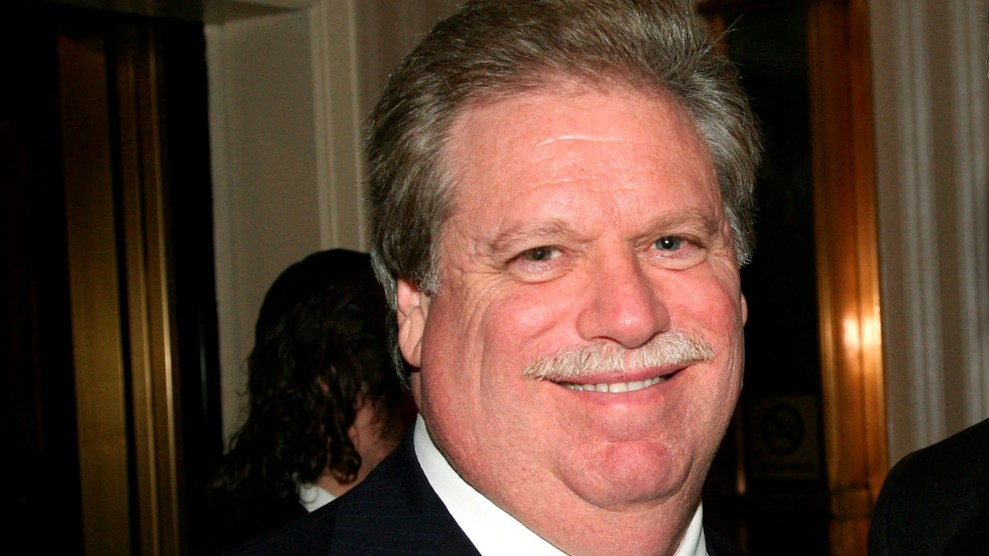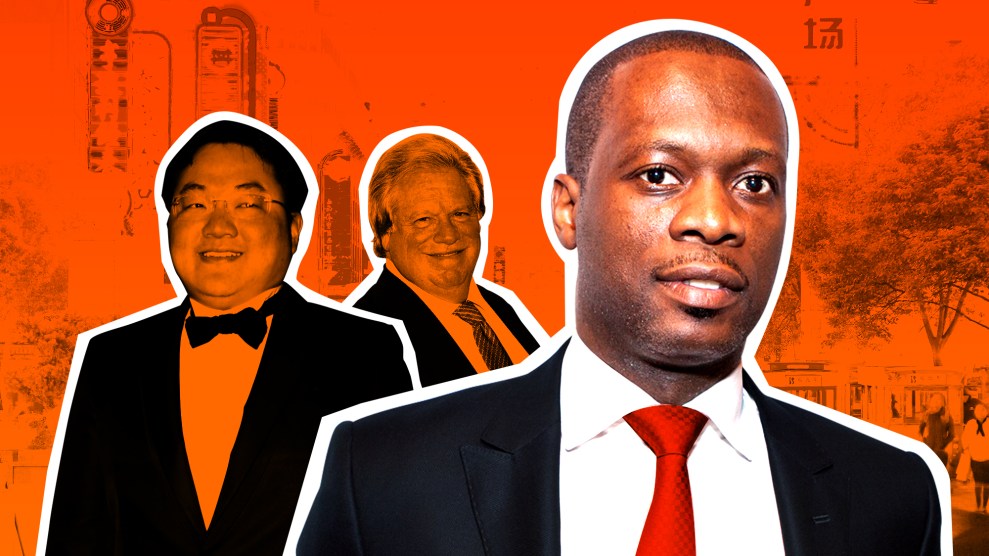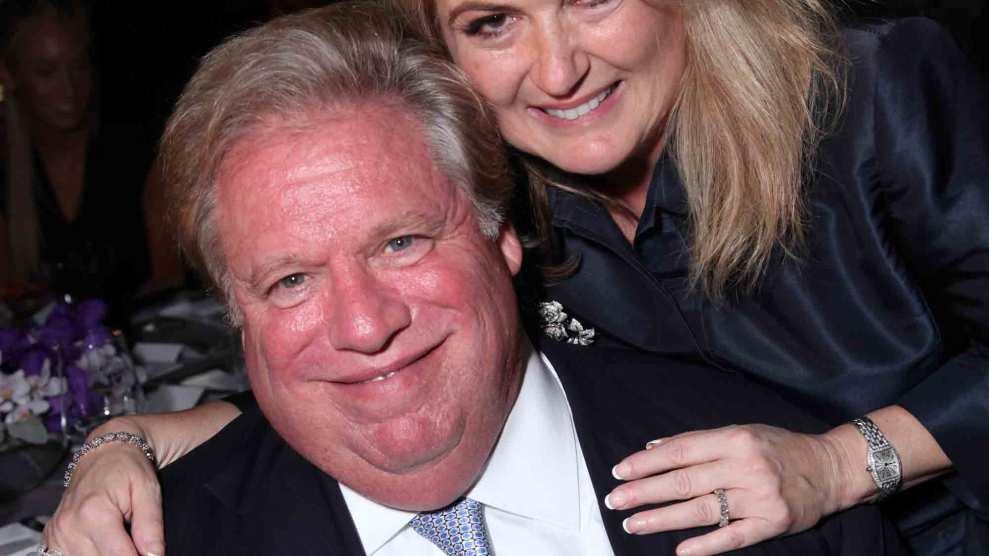
Elliott BroidyDavid Karp/AP
On May 25, 2017, Elliott Broidy texted Rick Gates with a message for Attorney General Jeff Sessions. Broidy, a top fundraiser for Donald Trump and the Republican National Committee, said that China would be willing to increase its cooperation with US law enforcement if the Justice Department deported Guo Wengui, a wealthy Chinese dissident living in New York.
“Mine is legitimate back channel,” Broidy wrote to Gates, a former top Trump campaign aide who Broidy had hired as a consultant. Broidy did not mention that he was in the process of receiving millions of dollars from a shady Malaysian businessman who had sought his help convincing the US government to extradite Guo.
These details were included in an extraordinary August 17 court filing alleging that a cadre of Republican power brokers and fundraisers tried to persuade the Trump administration to hand over Guo to China. In the filing, federal prosecutors say that Broidy broke a law requiring people acting in the United States as agents for foreign principals to register with the Justice Department. Broidy has so far not been charged with any crime. Gates has not been accused of wrongdoing in this matter.
The allegations date to a Wild West moment in Washington, DC, during which Broidy and Gates—two figures now known for their separate involvement in various controversies—joined forces. In early 2017, with established lobbying firms short on ties to Trump, influence peddlers claiming connections to the new president raced to step in. After Trump’s election, Broidy sought business in Romania, Angola, the United Arab Emirates, and elsewhere, while helping officials from those states gain access to the Trump administration. He hired Gates to advise him on the new administration and to provide “knowledge of how to deal with Trump,” Gates later told federal prosecutors. Broidy has maintained that he did not sell his access to Trump to foreign entities seeking favors from the administration.
The jockeying over Guo’s fate was apparently tied to a complex and bizarre international scheme marked by stunning corruption. According to federal prosecutors, a globe-trotting businessman named Jho Low hired Broidy to persuade the Justice Department to shut down investigations related to the embezzlement of an estimated $4.4 billion dollars from a Malaysian state-owned investment fund known as 1MDB.
Then, after Broidy met with a Chinese government minister at Low’s behest, Broidy and Gates also began pushing a Chinese priority: the deportation of Guo. A mysterious businessman who made billions in real estate in China, Guo fled to the United States in 2014 when it appeared likely that the Chinese government planned to charge him with financial crimes. Then, from a $67.5 million penthouse on Central Park, Guo launched high-profile attacks against Chinese Communist Party leaders, accusing them of corruption. Chinese authorities charged Guo with bribery and fraud in 2017. A former assistant also sued him for rape that year. Guo denies all the allegations, claiming they are politically motivated.
The effort to deport Guo and scuttle the 1MDB probe didn’t work. Guo stayed in the United States and went on to ramp up his anti-China efforts, working closely with another former Trump campaign official, Steve Bannon. As part of an unrelated money-laundering case, Bannon was arrested this month off the coast of Connecticut while staying on a yacht owned by Guo. And the Justice Department did not drop its 1MDB investigation. Low was indicted for money laundering and fraud in 2018. He later agreed to pay $1 billion in restitution, while remaining a fugitive, reportedly in China. Malaysian Prime Minister Najib Razak was defeated in a 2017 reelection bid and imprisoned in Malaysia for his role in the 1MDB scandal.
In their court filing, prosecutors charged GOP fundraiser Nickie Lum Davis with acting as an unregistered foreign agent. Davis is expected to plead guilty to one count in an arraignment Monday in federal court, under what a source familiar with the matter said is a cooperation agreement. Under federal sentencing guidelines, Davis is likely to avoid prison. Her attorney, Abbe Lowell, a prominent defense lawyer whose clients include Jared Kushner, did not respond to questions.
Since 2018, Broidy, a Beverly Hills venture capitalist and owner of an open source intelligence company, has reportedly faced a federal investigation into his activities. Broidy’s representatives have said he complied with the law. And he’s blamed his troubles on a hack of his email he says was orchestrated by agents of Qatar, who, he alleges, leaked damaging material to the media. Broidy claims Qatar targeted him due to his role supporting a blockade imposed on that country in June 2017 by several of its Middle Eastern neighbors, including Saudi Arabia and the UAE. The UAE in late 2017 awarded Broidy’s defense firm a lucrative contract.
But the case against Davis suggests that Broidy is drawing intensified federal scrutiny. The federal court filing says that Davis “aided and abetted” Broidy’s work as an unregistered agent of a foreign principal. The filing also accuses Pras Michel, the musician and former member of the Fugees, of participating in the undisclosed lobbying effort funded by Low. Federal prosecutors indicted Michel on separate but related charges last year. The Wall Street Journal first reported the allegations against Broidy and Michel in the recent filing.
Gates—who in 2018 struck a cooperation deal with federal prosecutors and who has testified against his longtime partner Paul Manafort and Trump adviser Roger Stone—appears to be helping law enforcement in this current case. Gates described his work with Broidy related to 1MDB in a March 18, 2018, meeting with law enforcement, according to an FBI summary of the session released in response to a freedom of information request by Buzzfeed.
The court filing submitted in the Davis case does not use the names of Broidy, Gates, Guo, or Michel, instead referring to them as Person B, Person D, PRC National A, and Person A, respectively. But people familiar with the case identified them.
An attorney for Broidy did not respond to questions. Gates’ attorney also did not respond to questions. A lawyer for Michel declined to comment.
The full story laid out by prosecutors is long and complicated. But here’s the gist of what they say happened: In 2016, the Justice Department began investigating Low for allegedly laundering proceeds from Malaysia’s 1MDB scheme in the United States. Low’s many investments included a Hollywood production company involved in several movies, including The Wolf of Wall Street. He developed relationships with celebrities, including Michel. In 2017, Low hoped to derail the Justice Department investigation of 1MDB and sought help in convincing prosecutors to drop the case. Michel connected Low to Davis, who in turn suggested Broidy, whose successful fundraising for Trump gave him entrée to the administration, including direct access to Trump.
According to prosecutors, Broidy, for $1 million, agreed to meet with Low in Bangkok in May 2017. For an $8 million retainer, Broidy began working to sway the Justice Department to drop its 1MDB investigation. To maintain distance from Low, Broidy allegedly said the money should come through another source. Payments went from a Hong Kong entity controlled by Low to a company created by Michel, then to an account connected to Broidy’s wife’s law practice. Broidy also drafted a contract through which he would be paid a $75 million “success fee” if the Justice Department dropped its 1MDB investigation within 180 days.
Broidy texted Gates in May, asking him to help set up a meeting between Trump and Najib, prosecutors say. The next month, Broidy began pushing for a round of golf between the two world leaders. Broidy believed such a meeting would allow the Malaysian prime minister to “attempt to resolve the 1MDB matter,” according to the filing. Broidy, who at the same time was seeking a defense contract with Malaysia, also “hoped that arranging golf with the President would further his business interests,” prosecutors say. In late June 2017, Broidy began pressing Gates and a “high ranking official in the White House” to arrange the golf outing. Broidy told the official that Trump had agreed to golf with Najib at one of Trump’s own courses.
As Broidy struggled to secure a date for the leaders to golf, he lashed out at the White House official. “I know you are busy and procedures apply but I’ve been more than patient,” he wrote. “Instead of being positive, this is now causing me damage. I would truly appreciate it if you could get back to me with a date. Thank you!”
Though the golf meeting never occurred, Najib did get a meeting with Trump in September 2017, and he also met with then-Secretary of State Rex Tillerson in August. According to the court filing, Michel gave Davis talking points “on behalf of” Low, then a target of the 1MDB investigation. These talking points, which said the 1MDB investigation had “caused unnecessary tension” in US-Malaysian relations, were intended for Tillerson as background. According to prosecutors, Davis gave the talking points to Broidy, who sent them to Gates, who said he would forward them to Tillerson’s office.
Broidy didn’t stop there. On October 6, 2017, he met with Trump at the White House. Afterward, Broidy told Low he had raised the 1MDB investigation with Trump, prosecutors say.
Concurrently, Broidy was pushing for Guo’s extradition, an effort he launched after a secret May 2017 meeting with Sun Lijun, then China’s vice minister of public security, in a hotel suite in Shenzhen, China. The meeting had been arranged by Low. Sun is not named in the filing but was identified by the Wall Street Journal. A source confirmed his identity to Mother Jones. Sun is now reportedly the subject of a corruption investigation in China.
Later that month, Broidy sent Gates a memo intended for Sessions. The memo cited an “opportunity for significantly increased law enforcement cooperation with China” on cybersecurity if Guo were deported. Prosecutors say that the content of the memo came from Low and Sun and that Gates told Broidy he delivered the memo to Sessions. A Justice Department spokesperson said in 2018 that Sessions did not receive the memo.
Broidy tried other avenues to help the Chinese win Guo’s extradition. He worked to get Sun high-level meetings during a US visit in late May 2017, including with Sessions, an effort that apparently failed. And in July, Broidy exchanged text messages with the senior White House official about Guo, prosecutors say.
Broidy also helped arrange for phone calls between Sun and casino mogul Steve Wynn, a friend of Trump who at the time was the RNC’s finance chair. On August 19, 2017, Broidy and Wynn called Trump from Wynn’s yacht to push for Guo’s extradition, prosecutors say.
Prosecutors did not use Wynn’s name in the legal filing; he was first identified by the Journal. In a statement, Wynn’s lawyer, Reid Weingarten, said Wynn’s actions were undertaken “not on behalf of a foreign government but rather entirely for the benefit of the United States.” Weingarten said Wynn had cooperated with the federal investigation into the matter.
Wynn stepped down from his RNC post in January 2018 amid allegations he had pressured employees at his casino company to perform sex acts. Wynn has denied those allegations. Broidy resigned from his RNC post in April 2018 after admitting he had paid $1.6 million to a former Playboy model who said she became pregnant during an affair with him.
In a statement to Mother Jones, Guo said China’s Communist Party has targeted him for “exposing their weaknesses.” He said the case against Davis “is only the tip of a far-ranging campaign the Chinese Communist Party has undertaken utilizing corrupt lawyers, government officials, and so-called lobbyists and political consultants to influence the US government at the highest levels to take action against me.”
“I have cooperated directly with the FBI and commend the US Department of Justice’s efforts to oust Nickie Lum Davis, CCP spies, and those greedy US accomplices who are willing to shed their democratic ideals to support the CCP,” he said.
This story has been revised.








